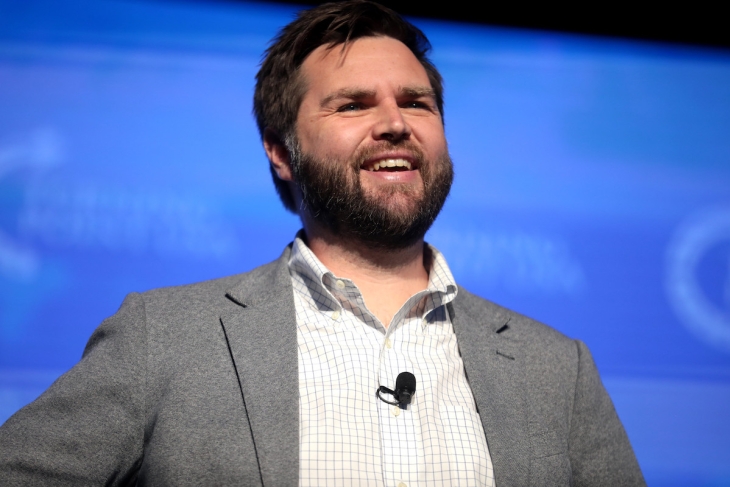The education-policy world tends to orbit around reforming urban schools. The impulse is understandable, given the serious academic struggles of poor children growing up in American cities. The media spotlight also shines brightest in big cities, revealing urban schools’ flaws, while governments and philanthropies have plowed billions into these school systems in hopes of making them better.
The work to improve urban education must continue in earnest, but such a myopic focus risks forgetting about education in rural areas and small towns. True, the achievement gaps are not nearly as staggering, and students from these communities almost always graduate from high school. But not everything is rosy, especially when it comes to readying young people for college and career.
Consider numbers from Middletown, famous as the gritty hometown of Ohio Senator J.D. Vance and now former President Trump’s running mate. Of its recent graduating classes, just 29 percent went on to college (two- or four-year) shortly after high school, and only 14 percent earned at least an associate degree by their mid-twenties. These post-secondary enrollment and completion numbers were much lower than for Ohio students as a whole (47 and 30 percent, respectively). Meanwhile, a mere 3 percent of Middletown students took an AP exam during high school, and even fewer passed one (14 percent passed an AP test statewide). Just one in ten earned industry credentials, with most of them being general certificates in things like CPR and occupational safety—not the high-powered credentials needed for skilled professions.
These disappointing outcomes aren’t limited to Middletown. We also see worrisome student readiness and post-secondary data in scores of other small town and rural districts across Ohio.
The political rise of Senator Vance could do much good for students from rural areas and small towns. Now, it is true that vice presidents don’t typically drive education policy, and many conservatives have been skeptical of a strong federal role in education. In his two years in the U.S. Senate, Vance hasn’t built a lengthy track record in K–12 education. In sum, we don’t have a clear indication of what he would do in this area—if anything—should he become VP.
That said, Vance is known for writing and speaking passionately about the challenges of growing up poor in rural America. He’s expressed concern about the lack of social and economic mobility for disadvantaged children, especially those living in blue-collar communities like Middletown. As he noted in a 2017 speech—co-sponsored by Fordham—at the Columbus Metropolitan Club, “Children who grow up on the bottom of the economic ladder very often tend to stay there…I think that should really worry us.” He also described barriers—some from his own experience—that hold back young people with less social capital. And in his GOP convention speech, Vance pledged not to forget the hardworking folks from the heartland:
And I promise you one more thing. To the people of Middletown, Ohio, and all the forgotten communities in Michigan, Wisconsin, Pennsylvania, and Ohio, and every corner of our nation, I promise you this: I will be a vice president who never forgets where he came from.
Given all this, it’s not hard to picture Vance putting rural and small-town education more front and center. He might stick to talking about the challenges students from these communities face, and the urgency of providing opportunities for advancement. Or he might also seek concrete ways to improve rural education through policymaking at the federal level or use his platform to promote ideas that could be pursued by state leaders.
We have some general ideas that we’d encourage Vance to consider (we’re sure there are many other possibilities worth considering, too).
- Supporting high-quality career and technical education (CTE). Providing students with rigorous CTE opportunities can open doors to good job opportunities that help students to climb the socio-economic ladder. Yet CTE in many schools is still not geared to helping students gain the technical skills needed for in-demand careers. As Oren Cass has noted, the federal government subsidizes higher education at far more generous levels than CTE and workforce programs. If elected VP, Vance might push for a more balanced approach to workforce development by ratcheting up federal investments for high-quality CTE programming in high school.
- Providing hands-on career opportunities for rural and small-town students. One advantage of growing up in a metro area is the chance to explore various careers during high school. Students living in and around Columbus could seek job-shadowing, part-time work, or an internship with a plethora of employers, including large healthcare networks, advanced manufacturers, IT firms (including, soon, Intel), financial institutions, and more. Career opportunities are far more limited in sparsely populated areas. One potential way to address this barrier might be a scholarship that provides high school juniors or seniors from rural and small-town communities an opportunity to do summer internships with an employer located in a larger city.
- Promoting academic rigor for high-achieving students from rural and small towns. Advanced coursework opportunities, such as AP or IB, range from limited to non-existent in rural schools. Schools may find it hard to achieve a “critical mass” of students who are interested and able to tackle courses such as AP Chemistry or AP Calculus. And there may not be a teacher with the specialized expertise to lead such a course. The lack of advanced courses puts high-achieving students a couple steps behind as they pursue college admissions and success in higher education. One way to increase advanced coursework might be to launch a cohort of trained high school instructors who teach advanced courses at multiple sites in sparsely populated areas—somewhat akin to travel nurses or itinerant physicians. Another possibility is to bolster high-quality online course choice which would also increase access to rigorous coursework.
- Giving educational choice a boost in rural and small-town communities. Consistent with the GOP platform and his comments about parental rights, Vance is sure to support school choice. But as reporters have pointed out in pieces about the expansion of private school vouchers, less populated areas tend to have fewer schooling options, and some rural Republicans have even been cool towards choice as a result. As VP, Vance could provide leadership on this issue and perhaps warm rural and small-town communities to the concept of educational choice. He might help calm irrational fears stoked by critics about the purported impacts on districts, and he could champion parental empowerment—no matter where families live. As for concrete policy actions, he could push for additional federal aid to grow public charter schools in non-urban (and urban) communities and explore ways to provide seed-funding to launch private school options.
Every student—just as Vance has done—deserves the opportunity to pursue the American dream. Achieving this aim begins with excellent schools in all quarters of the state that focus on academic success and open doors to college and great careers. Yes, November is a long way off. But the remarkable ascent of Senator Vance into the national limelight could bode well for rural and small-town students, and we’d encourage him to increase the emphasis on their opportunities for success.

